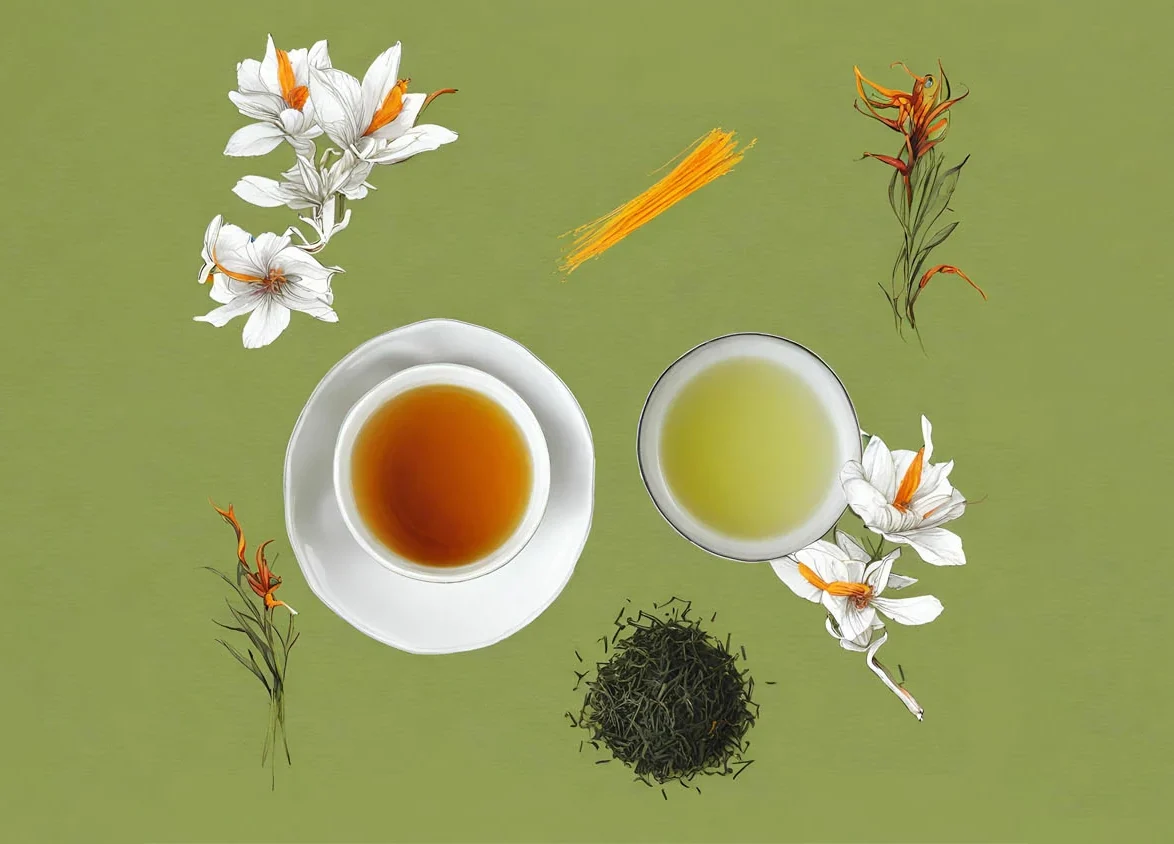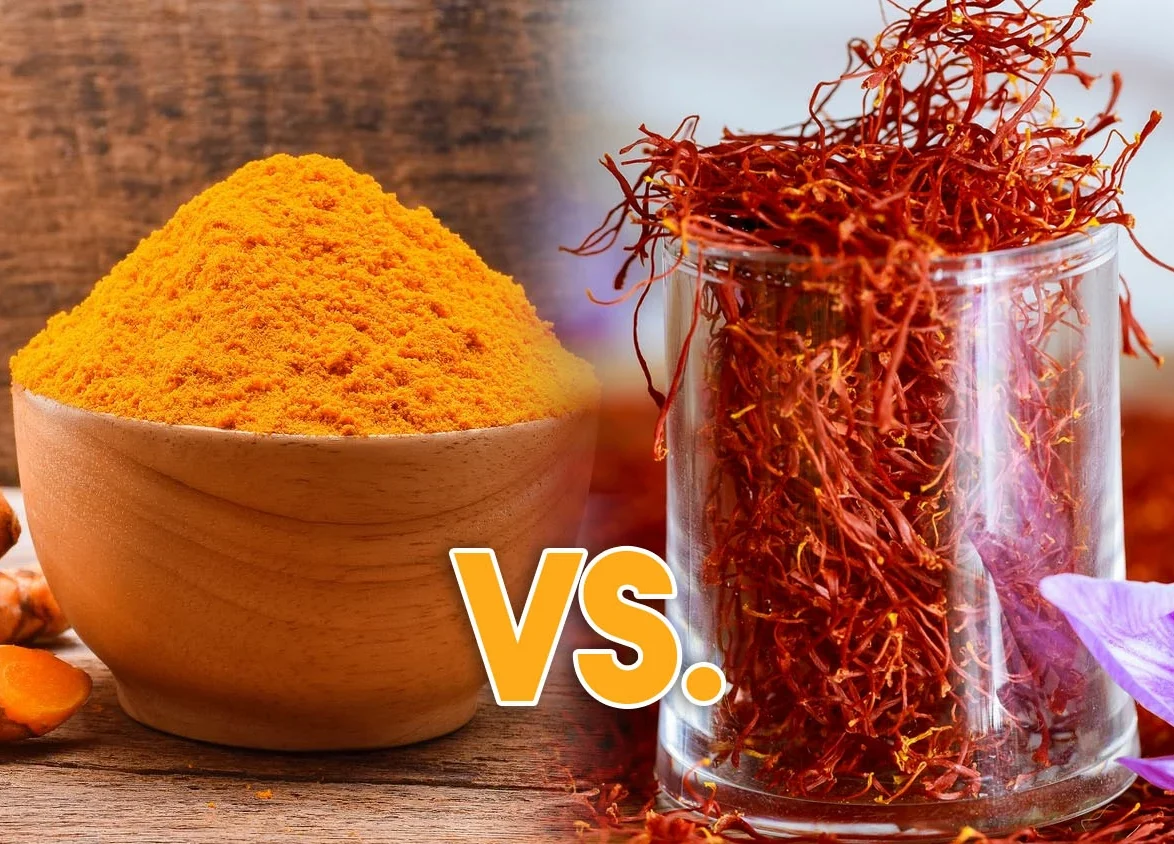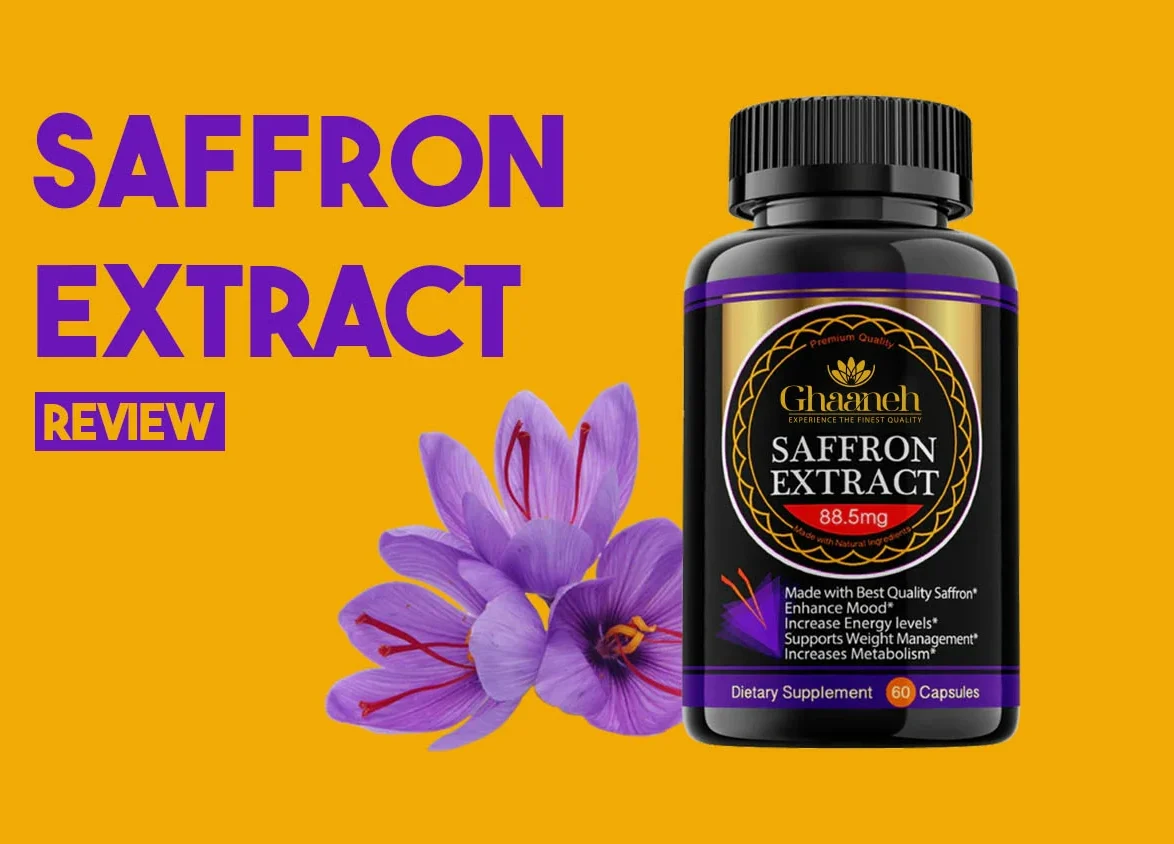I thoroughly enjoy Queen of Flowers Saffron. It is quite versatile and adds a unique dimension of flavor to any dish or drink, I rate it Top-notch!
saffron: benefits, nutrition and antioxidants
Summary : Saffron is a vibrant spice rich in health-promoting compounds, including carotenoid antioxidants. Studies indicate it has anti-inflammatory and antioxidant properties, potentially benefiting heart health, reducing depression and anxiety symptoms, improving sleep, and safeguarding eye health.
Saffron and Green Tea: Benefits, Weight Loss & Side Effects
10 Important Health Benefits Of Saffron For Kids
Turmeric Vs. Saffron: Benefits, Taste & Key Differences
Treating Depression with Saffron: Benefits and Side Effects
Medical Benefits Of Saffron on Blood Pressure
Best Saffron Supplement in 2024: Review & Top Pick
Surprising Facts About Saffron Benefits for Brain!
The Magical Benefits of Saffron, More Than A Spice!
Impressive Health Benefits of Saffron
Saffron, the expensive spice, offers a multitude of health benefits. This prized spice is rich in antioxidants, which can help protect the body from oxidative stress and inflammation. Additionally, it may aid in weight management by suppressing appetite and reducing cravings. Furthermore, saffron has been used for centuries in traditional medicine to treat a variety of ailments, including menstrual discomfort and digestive issues. With its potent medicinal properties, saffron is a valuable addition to any diet for overall health and well-being. Clinical trials have shown that saffron has beneficial effects on various health conditions, including premenstrual syndrome, blood pressure, and overall well-being.In this article, we will explore the various benefits of saffron in detail.
1. A powerful antioxidant
Saffron contains several bioactive compounds such as crocin, crocetin, and safranal that exhibit potent antioxidant properties. These compounds help neutralize harmful free radicals in the body, reducing oxidative stress and protecting cells from damage. This antioxidant activity has been linked to a reduced risk of chronic diseases such as cancer, cardiovascular diseases, and neurodegenerative disorders.
2. Anti-inflammatory effects:
Chronic inflammation is a common underlying factor in many diseases such as arthritis, diabetes, and cardiovascular diseases. Saffron has been shown to possess anti-inflammatory properties that can help alleviate inflammation and associated symptoms. Studies have demonstrated that saffron extracts can inhibit pro-inflammatory molecules and enzymes in the body, reducing inflammation markers.
3. Mood enhancement:
Saffron has long been used in traditional medicine for its mood-enhancing properties. Research suggests that saffron may be effective in treating mild-to-moderate depression by increasing levels of certain neurotransmitters like serotonin and dopamine in the brain. Several clinical trials have shown that saffron supplementation can improve symptoms of depression and anxiety with comparable efficacy to conventional antidepressant medications.
4. Cognitive function improvement:
The bioactive compounds present in saffron have been found to exert positive effects on cognitive function and memory. Studies have shown that saffron supplementation can enhance learning abilities, improve memory retention, and protect against age-related cognitive decline. The antioxidant properties of saffron play a crucial role in preserving brain health by reducing oxidative stress and inflammation.
5. Eye health promotion:
Saffron contains carotenoids such as crocin that are beneficial for eye health. These compounds have been found to protect retinal cells from damage caused by oxidative stress and age-related macular degeneration (AMD). Saffron supplementation has shown promising results in improving visual acuity, color vision, contrast sensitivity, and reducing the progression of AMD.
6. Heart health support:
Saffron possesses several cardiovascular benefits due to its antioxidant and anti-inflammatory properties. It helps lower blood pressure levels by relaxing blood vessels and improving blood flow. Additionally, it reduces cholesterol levels by inhibiting cholesterol synthesis in the liver while increasing high-density lipoprotein (HDL) or “good” cholesterol levels.
7. Anti-diabetic effects:
Saffron has demonstrated potential anti-diabetic effects by improving insulin sensitivity and regulating blood sugar levels. Studies have shown that saffron extracts can reduce fasting blood glucose levels while increasing insulin production or utilization in diabetic individuals.
8. Cancer prevention:
The antioxidant compounds present in saffron exhibit anticancer properties by inhibiting tumor growth and inducing apoptosis (programmed cell death) in cancer cells without harming healthy cells. Various studies have highlighted the potential chemopreventive effects of saffron against different types of cancers including breast cancer, colon cancer, lung cancer, prostate cancer, etc.
9. Digestive health improvement:
Saffron has been shown to have a positive impact on digestive health. It contains compounds that can help improve digestion and reduce symptoms of digestive disorders such as bloating, gas, and indigestion. Saffron also has anti-inflammatory properties that can help reduce inflammation in the digestive tract, which may alleviate symptoms of conditions such as irritable bowel syndrome (IBS) and ulcerative colitis.
Additionally, saffron has been found to have a protective effect on the stomach lining, which can help prevent the development of ulcers and other gastrointestinal issues. Its antioxidant properties may also help protect the digestive system from damage caused by free radicals. Overall, incorporating saffron into your diet may help support overall digestive health and improve symptoms of various digestive disorders.
10. Allergic reaction:
Saffron has been found to have anti-allergic properties that can help alleviate allergic reactions. It contains compounds such as crocin and safranal, which have been shown to reduce the release of histamine, a key player in allergic responses. This can help to decrease symptoms such as sneezing, itching, and congestion. Additionally, saffron has anti-inflammatory properties that can help reduce inflammation associated with allergic reactions. Its antioxidant properties also play a role in reducing oxidative stress and protecting against allergic responses. Overall, saffron can be a valuable natural remedy for managing allergic reactions and promoting overall wellness
Common usage of saffron
For PMS
One of the most well-known effects of saffron is its ability to alleviate symptoms of premenstrual syndrome (PMS). PMS is a common condition that affects many women during their reproductive years, causing physical and emotional symptoms such as bloating, mood swings, and fatigue. Saffron supplements have been found to reduce the severity of these symptoms, providing relief for women who suffer from PMS.
In a clinical trial conducted by researchers at Tehran University of Medical Sciences in Iran, 75 women with PMS were given either saffron capsules or a placebo for two menstrual cycles. The results showed that the group taking saffron experienced a significant reduction in symptoms compared to the placebo group. This study demonstrated the potential of saffron as a natural remedy for managing PMS.
Blood Pressure
Aside from its effects on PMS, saffron has also been found to have beneficial effects on blood pressure. High blood pressure is a major risk factor for cardiovascular disease, which is one of the leading causes of death worldwide. Studies have shown that saffron can help lower blood pressure levels, potentially reducing the risk of heart disease and stroke.
A review published in the Journal of Integrative Medicine analyzed several clinical trials on the effects of saffron on blood pressure. The findings indicated that saffron supplementation led to significant reductions in both systolic and diastolic blood pressure levels. These results suggest that incorporating saffron into one’s diet or taking saffron supplements may be an effective way to manage hypertension and improve cardiovascular health.
Medical Properties
In addition to its effects on specific health conditions, saffron also possesses various medicinal properties that contribute to its overall health benefits. Saffron contains several bioactive compounds such as crocin, crocetin, and safranal, which have antioxidant, anti-inflammatory, and neuroprotective properties. These compounds are believed to play a role in the beneficial effects of saffron on health.
The antioxidant properties of saffron help protect cells from damage caused by free radicals, which are unstable molecules that can lead to chronic diseases such as cancer and diabetes. Saffron’s anti-inflammatory properties may also help reduce inflammation in the body, which is linked to various health issues including arthritis and heart disease. Furthermore, studies have suggested that saffron’s neuroprotective properties could potentially benefit cognitive function and mental health.
Overall, the medicinal properties of saffron make it a valuable natural remedy for promoting overall well-being and preventing chronic diseases. Incorporating this spice into one’s diet or taking saffron supplements may offer numerous health benefits beyond just adding flavor to dishes
What are the health benefits of saffron tea?
1. Antidepressant
Saffron tea has been found to have potential antidepressant effects due to its active compounds, including crocin and safranal. These compounds have been shown to have mood-lifting properties and may help alleviate symptoms of depression. Saffron tea also contains antioxidants that can help reduce inflammation in the brain, which is often associated with depression.
Additionally, saffron tea may help regulate neurotransmitters such as serotonin and dopamine, which play a crucial role in mood regulation. Some studies have suggested that saffron may be as effective as certain antidepressant medications in improving symptoms of depression. However, more research is needed to fully understand the mechanisms behind saffron’s antidepressant effects and its potential as a natural treatment for depression. Overall, incorporating saffron tea into a balanced diet may offer some mental health benefits for those struggling with depression.
2. Heart health
Saffron tea has been shown to have potential benefits for heart health due to its high levels of antioxidants, including crocin and safranal, which have been found to help reduce inflammation and oxidative stress in the body. These compounds may also help improve blood flow and circulation, as well as lower blood pressure and cholesterol levels, all of which are important factors in maintaining a healthy heart. Additionally, saffron tea has been linked to reducing the risk of developing cardiovascular diseases such as heart disease and stroke, making it a valuable addition to a heart-healthy diet.
3. PMS treatment
Saffron tea has been shown to have potential health benefits for women suffering from premenstrual syndrome (PMS). The active compounds in saffron, such as crocin and safranal, have been found to have mood-enhancing and anti-depressant effects, which can help alleviate symptoms of PMS such as irritability, anxiety, and mood swings. Additionally, saffron has anti-inflammatory properties that may help reduce pain and discomfort associated with PMS. Drinking saffron tea regularly may also help regulate hormone levels and improve overall well-being during the menstrual cycle. Overall, saffron tea can be a natural and effective option for managing PMS symptoms.
4. Boosts memory
Saffron tea has been found to have potential memory-boosting effects due to its high levels of antioxidants and anti-inflammatory properties. The active compounds in saffron, such as crocin and crocetin, have been shown to improve cognitive function and protect the brain from oxidative stress. Additionally, saffron has been linked to increased levels of serotonin and dopamine, which are neurotransmitters that play a role in memory and learning. Regular consumption of saffron tea may help enhance memory and cognitive function, making it a beneficial addition to a healthy lifestyle.
5. Cancer prevention
Saffron tea contains powerful antioxidants such as crocin and safranal, which have been shown to have anti-cancer properties. These antioxidants help to protect cells from damage caused by free radicals and reduce inflammation, both of which are linked to the development of cancer. Additionally, saffron has been found to inhibit the growth of cancer cells and induce apoptosis, or programmed cell death, in various types of cancer. Studies have also suggested that saffron may enhance the effectiveness of chemotherapy and radiation therapy while reducing their side effects. Overall, regular consumption of saffron tea may help in preventing the development and progression of cancer.
How to make saffron tea?
To make saffron tea, you will need the following ingredients:
– 1-2 strands of saffron
– 1 cup of water
– Honey or sugar (optional)
– Lemon (optional)
Here’s how to make saffron tea:
- Heat the water in a small saucepan until it comes to a gentle boil.
- Add the saffron strands to the boiling water and let it steep for about 5-10 minutes. This will allow the saffron to release its flavor and color into the water.
- After steeping, strain the saffron tea into a cup using a fine mesh strainer or a tea infuser.
- If desired, you can sweeten the saffron tea with honey or sugar to taste.
- You can also add a squeeze of lemon juice for some extra flavor if you like.
- Stir well and enjoy your delicious and aromatic saffron tea!
Note: Saffron is a potent spice, so a little goes a long way. Start with just 1-2 strands per cup of water and adjust according to your taste preference.
Warning
While there is growing evidence supporting the beneficial effects of saffron on health conditions, it is important to note that more research is needed to fully understand its mechanisms and potential applications. As with any natural remedy or supplement, it is advisable to consult with a healthcare professional before using saffron for medicinal purposes.
Conclusion
In conclusion, saffron offers a wide range of benefits, including its potential to improve mood, reduce symptoms of PMS, enhance memory and cognition, and provide antioxidant and anti-inflammatory properties. Its versatility in culinary applications and traditional medicinal uses make it a valuable addition to any diet or wellness routine. With its rich history and promising research, saffron stands as a powerful natural remedy with numerous potential health benefits.It has demonstrated promising effects on various health conditions through clinical trials and research studies. Its ability to alleviate symptoms of premenstrual syndrome, lower blood pressure levels, and provide overall health benefits makes it a valuable natural remedy
FAQs
Pregnant women should avoid saffron as it may stimulate uterine contractions. People with bipolar disorder should avoid saffron as it may worsen symptoms. Those with allergies to plants in the same family as saffron, such as lilies, should also avoid it.
There is limited scientific evidence to support the claim that saffron increases testosterone levels. Some studies have suggested that saffron may have a positive effect on male sexual function, but more research is needed to confirm its impact on testosterone levels. It is always best to consult with a healthcare professional before using saffron or any other supplement for hormonal health.
Eating saffron everyday in moderate amounts can have potential health benefits such as improved mood, reduced anxiety and depression, and enhanced memory and cognition. However, consuming large amounts of saffron can lead to side effects such as dizziness, nausea, and vomiting. It is important to consume saffron in moderation and consult with a healthcare professional before making it a daily part of your diet.










Nothing compares to saffron powder. it’s easy and it does have a great coloring effect. Loved it, thanks to ghaaneh saffron.
I was curios about saffron and i landed in your shop (looks amazing btw), I have never made an online order for saffron, so when I made my first attempt and trusted ghaaneh saffron, they truly delivered. I will certainly buy again when I run out of saffron. THANKS
Excellent product, i had the pleasure to enjoy this saffron with a decent price! kudos to you guys.
Oh to have the Persian saffron in your rice dish is a blessing! thank you ghaaneh for this amazing delivery.
Never had such a good online shop experience, i tell you from the moment i contacted you guys to the second you delivered to my doorstep, it all was smooth! thanks and will be buying again.